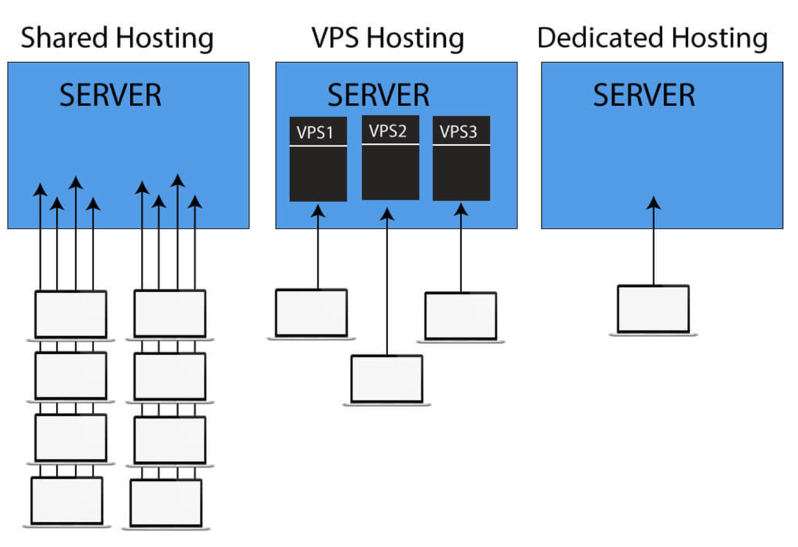What criteria should be considered to choose the best VPS in the USA for optimal hosting solutions?

VPS or Virtual Private Server hosting providers grant access to computer servers through the rental of Virtual Machines (VMs), providing services comparable to the private sector but at a more economical cost. This hosting type is specifically designed for websites, allowing them to be hosted on a dedicated server within a scalable virtual environment. Utilizing VPS hosting enables multiple virtual instances to coexist seamlessly on a single server without impacting the performance of websites hosted on other servers.
Typically, VPS hosting is well-suited for organizations in need of greater server resources than those provided by shared hosting plans but find dedicated hosting cost-prohibitive. Server resources, including RAM, CPU, and Internet Bandwidth, are shared among all accounts hosted on the server, with specific portions reserved for each VPS user.
Key features of VPS web hosting services include management tools like cPanel or native control panels, streamlining the setup process and server administration. Users with the necessary expertise can manage these aspects independently. Conversely, managed VPS hosting plans take care of maintenance, configurations, and updates, allowing users to focus on their clients, sales, and website development.
Let’s delve into some essential aspects that will enhance our understanding of VPS hosting services.
Jump To...
Comparing VPS Hosting to Shared and Dedicated Hosting

Grasping the distinctions between shared hosting and dedicated hosting is crucial when evaluating VPS, which can be seen as a middle ground in terms of quality, flexibility, and cost. This understanding is essential for determining whether VPS is the optimal web hosting solution for you. Depending on your needs and usage, there are various free and budget-friendly VPS hosting options available. It is recommended to start by exploring shared hosting.
Comparing VPS Hosting to Shared Hosting

In a shared web hosting setup, multiple websites share the processing and storage capacity of a single web server. With numerous providers offering shared plans for just a few dollars per month, it stands out as the most cost-effective option for web hosting.
In comparison to shared hosting, VPS hosting involves hosting multiple websites on a single physical server. However, VPS hosting distinguishes itself by effectively isolating each website on a distinct virtual server with its unique IP address. This configuration provides several advantages over shared plans:
Speed and Resources
The distribution of resources marks a prominent distinction between VPS hosting and shared hosting. In shared hosting, all websites on a server collectively utilize its processing power. Consequently, if one website on the server experiences substantial traffic, the performance of every other site is affected. Shared servers can accommodate dozens or even hundreds of websites, posing a potential risk to your website’s performance and reputation.
Yet, VPS hosting ensures a consistent and dedicated level of processing power for each website. As a result, VPS websites typically load faster, unaffected by the traffic levels experienced by other sites. Moreover, should the need arise for additional bandwidth or storage space, numerous providers offer the flexibility to swiftly adjust your restrictions.
Moreover, in the event that you require additional bandwidth or storage space, several companies facilitate the rapid adjustment of these limitations. This provides a scalable solution, allowing you to adapt to changing demands without compromising performance.
Flexibility and Customization
Enhanced flexibility and customization distinguish VPS from shared hosting. With VPS, secure dedicated server space empowers you to customize the operating system, install a wide range of programs, and access server files managed by your IT team. For example, a virtual private server allows adjustments to server-side language or database management software.
Security
Most importantly, websites hosted on VPSs enjoy enhanced security compared to those on shared servers. In a shared server environment, the risk of unauthorized access, reading, or alterations to your website files is heightened in the event of a breach. However, VPS provides isolated hosting, safeguarding your files against intrusions on the same physical server. This heightened security extends to DDoS attacks as well, with the performance of your VPS being less susceptible to impact from an assault on another VPS. Furthermore, administrators have the freedom to implement additional security measures as they have greater control over the server software.
While shared hosting is more cost-effective than VPS hosting, many websites initially opt for shared plans and later transition to VPS hosting as their traffic grows and the need for heightened security becomes paramount. This progression in hosting plans is reflected in the accompanying increase in cost.
Moreover, due to the security benefits, websites engaged in business operations and handling personal data typically opt for VPS hosting as a minimum standard. For instance, when establishing an e-commerce website, starting with a VPS is advisable to achieve PCI compliance for secure online payments.
If you require further insights to make an informed choice between these options, explore our comprehensive comparison of VPS vs. shared hosting.
Comparing VPS Hosting between Dedicated Hosting

Contrary to VPS hosting, dedicated hosting provides exclusive access to an entire physical server, offering heightened flexibility, performance, and security.
Typically, dedicated hosting surpasses VPS hosting in scenarios where websites experience substantial visitor traffic and have specific requirements. System administrators benefit from greater control over resource allocations and the ability to implement hardware modifications tailored to their unique needs. Dedicated servers are commonly preferred for online retailers and heavily utilized web applications.
However, among the three options explored, dedicated hosting is undeniably the most costly, as one would expect. This implies that smaller websites are often inclined to compromise with a VPS if they seek the benefits of an isolated server.
In summary, VPS hosting proves to be the optimal choice for small to medium-sized websites in need of the flexibility, security, and speed akin to a dedicated server but at a significantly lower cost. The common trajectory involves websites starting on shared hosting and subsequently transitioning to VPS hosting, or commencing directly with VPS hosting for enhanced hosting capabilities from the outset.
Considering your business location is crucial, and location-based hosting should be taken into account. If you reside in the US, exploring a US VPS service is advisable. Additionally, businesses utilizing VPS hosting have the option to eventually upgrade to a dedicated plan for maximum control over their hosting environment.
Varieties of VPS Hosting

Unmanaged VPS hosting and Fully Managed VPS hosting represent the two main categories. A clear understanding of the differences between these two options will assist you in making the best decision for your website.
Completely managed VPS
A comprehensively managed VPS hosting plan is overseen by the hosting company. Ideal for busy teams or businesses lacking IT support, this solution entails the web host taking care of all aspects for you.
Pros
- All of your technical requirements, including server upkeep, upgrades, monitoring, and security, are handled by the web hosting provider.
- Plans include technical assistance.
Cons
It is more expensive because you are paying for the convenience and knowledge.
Your customization choices are limited because the hosting firm determines the server setup and specifications.
Software installation can need the administrator’s permission.
Best for
Teams who are unable to manage their servers due to a lack of technological expertise.
Proprietors of websites without a developer or server administrator.
Unmanaged VPS
In unmanaged VPS hosting, also known as self-managed VPS hosting, users retain full control. The hosting company is responsible solely for providing the physical servers.
Pros
You are free to completely personalize your server; there is no need to wait to install things.
More affordable than a managed VPS.
Cons
If you encounter any problems, you must solve them on your own.
If your server administrator is inexperienced, you might need more help.
Best for
Teams with the requisite knowledge and proficiency to manage their servers.
Comprehending the Role of VPS Hosting

- VPS hosting emerges as a versatile and efficient solution catering to the unique needs of diverse online businesses. Its popularity has surged among both enterprises and individuals due to its ability to deliver exceptional performance and reliability.
- For eCommerce websites grappling with substantial traffic, VPS hosting provides the power and performance necessary for seamless and swift transactions. Leveraging specialized resources, online retailers can enhance the shopping experience, ensuring increased customer satisfaction and retention.
- In the realm of Software-as-a-Service (SaaS), VPS hosting empowers vendors to deliver applications and services more efficiently. The isolated environment contributes to heightened security and data privacy, particularly crucial for processing sensitive user information and safeguarding intellectual property.
- VPS hosting stands out as an excellent choice for businesses, programmers, and developers handling multiple websites. The server’s ability to be divided into numerous virtual machines ensures that each website enjoys its dedicated resources, eliminating the risk of resource congestion and ensuring optimal performance.
- When a website outgrows the limitations of a shared hosting plan, VPS hosting becomes almost indispensable. Its scalable architecture can effectively manage resource-intensive software, increased traffic, and other demanding tasks. In contrast to shared hosting, VPS hosting guarantees consistent performance, even during periods of heavy traffic.
- One of the key advantages of VPS hosting is the secure backup environment it provides. Businesses familiar with the detrimental effects of data loss understand its impact. VPS hosting ensures that crucial information is regularly and securely backed up, significantly reducing the risk of data loss due to hardware issues or unforeseen events.
- Furthermore, VPS hosting provides reliable document storage accessible from anywhere worldwide, facilitating remote collaboration for clients or colleagues. Regardless of the physical location of your colleagues, this convenience ultimately enhances productivity and streamlines workflows.
- VPS hosting offers excellent support for email hosting, particularly beneficial for businesses heavily reliant on email communication. With complete control over your email servers, you can ensure effective spam prevention, consistent email delivery, and settings tailored to your specific requirements.
- Last but not least, VPS hosting opens up possibilities for cloud-based hosting, enabling businesses to effortlessly create and manage cloud-based applications. With VPS, harnessing the flexibility and agility of cloud computing to address evolving business needs becomes feasible.
Advantages of VPS Hosting
VPS hosting provides dedicated resources, scalability, security, customization, and cost-efficiency, making it an ideal choice for individuals and businesses.Let’s delve deeper into each of the points you mentioned:

Storage and Bandwidth
VPS hosting typically includes ample storage space and bandwidth, crucial for hosting resource-intensive websites, apps, and databases. Users can choose plans tailored to their specific requirements, ensuring optimal performance for their projects.
Server Control
In contrast to shared hosting, VPS hosting offers enhanced control. With root access or administrative rights, users can install, configure, and customize software and settings according to their preferences. This level of control is particularly advantageous for developers and businesses requiring specific configurations.
Reliability
VPS hosting is more reliable than shared hosting as each VPS operates in its own isolated environment. Unlike shared hosting, where one user’s actions can affect others, VPS instances are autonomous, minimizing the impact of different accounts on each other. This isolation contributes to more consistent performance and uptime.
Privacy and Security
In contrast to shared hosting, VPS hosting enhances privacy and security by isolating instances, ensuring that your data and applications remain unaffected by other users on the same server. This isolation reduces the risk of security breaches due to potential software flaws in other users’ systems. VPS hosting often includes features such as firewalls, security monitoring, and regular updates to further enhance data protection.
Scalability and Flexibility
VPS hosting provides enhanced scalability and flexibility, allowing users to easily adjust resources (CPU, RAM, and storage) based on their changing needs. This scalability ensures that websites and applications can effortlessly adapt to increasing traffic and resource requirements.
When is the right time to transition to VPS hosting?

Here are some reasons to consider moving to a VPS hosting provider:
Multiple factors could lead to sluggish website performance or server issues:
There is more traffic coming to you than usual.
There are many files hosted by you.
The demands of your website exceed the capabilities of your web server.
A slow-loading website poses significant challenges for an online business, potentially affecting conversion rates. According to Portent, websites loading in under a second have a conversion rate five times higher than those taking more than ten seconds.
The good news is that selecting the right web hosting package can accelerate your website’s loading time. If your website is well-optimized but still loads slowly on a shared hosting plan, it might be prudent to consider VPS hosting.
For online businesses, relying on a shared hosting package may not be advantageous for your store’s performance and user experience.
E-commerce platforms demand increased resources due to higher traffic compared to blogs. Additionally, they necessitate secure environments as they handle sensitive financial information.
Shared hosting configurations are more susceptible to cyberattacks, raising the risk of security breaches.
As an illustration, in December 2022, cybercriminals infiltrated the shared network of another hosting provider, introducing malware to its systems. Subsequently, the hackers gained access to website login credentials for some users on those servers.
In a shared hosting environment where multiple users share the same space, a cyberattack on one website poses a threat to other websites on the server.
In contrast, this type of hack is not a concern in VPS setups.
Despite VPS-hosted websites appearing to be on a single server due to virtualization, the website files are likely distributed across multiple servers. Even if hackers compromise one server, other servers remain unaffected.
Custom installations are necessary: Shared hosting suits blogs and simpler websites, particularly for WordPress users. However, if you require installing specific applications or making specific adjustments, a hosting plan with more control is necessary.
Choosing the optimal VPS hosting provider

When selecting the optimal Windows VPS hosting service for your online endeavors, several critical factors come into play. Among the array of options available, the decision between managed and unmanaged Windows VPS plans is pivotal for ensuring the success of your website or business.
Let’s delve into the details of each option to help you make an informed choice.
Cost
Before opting for a VPS hosting service, consider their billing structure. Understanding the breakdown of your expenses is crucial since hosting fees are usually recurring. You’re typically paying for services such as space, bandwidth, speed, backup, security, and other offerings provided by your hosting company.
Reviews
Evaluating consumer feedback is a valuable method for assessing VPS providers. Explore online reviews and, if necessary, reach out to the hosting company with any inquiries. This is a key strategy for determining whether a company demonstrates patience, transparency, and responsiveness in dealing with its customers.
Reliability
Ensuring high reliability and minimal downtime is crucial when selecting a VPS provider. Online reviews can provide insights, and another approach is to test the VPS by signing up for a trial or using a demo. This allows you to assess the performance and suitability of the VPS hosting service before committing to it for your actual website.
Services, Resources, and Capabilities
It’s essential to inquire with your VPS provider about the benefits, features, and resources they offer. Explore their ‘add-on’ options to see additional services you can obtain. Since your website’s reliability relies heavily on the VPS provider, it’s crucial to view them as a “partner” rather than just a vendor. Ensure they are committed to your long-term success.
Customer service
Choosing a VPS hosting provider is like selecting your “lifeline.” Ensure you can seek immediate assistance when issues arise and that you’ll receive prompt care. Verify if your VPS hosting company provides call center support or 24-hour online chat support, similar to having access to a doctor around-the-clock in case of illness – an essential aspect!
Comparing the Managed and unmanaged VPS hosting
This is an additional crucial consideration because it defines the scope of services your VPS provider delivers. In the case of unmanaged hosting, your VPS hosting company is responsible for ensuring your VPS is operational and network-connected. Managed VPS hosting entails that your hosting provider must handle a broader range of tasks, including server security, reliability, and more.
As a result, when using a managed VPS hosting service and encountering an issue, your hosting company will address it on your behalf, unlike an unmanaged hosting service where you are responsible for resolving any problems. This distinction proves to be highly advantageous to have.
Top VPS Hosting Providers for 2023

Selecting the ideal VPS hosting provider is crucial for ensuring optimal website performance. With numerous options available, making the right choice can be challenging. After extensive testing, we have identified the top VPS hosting providers based on factors such as support, pricing, resources, and overall performance. Continue reading to discover the best VPS hosting services that cater to various needs and requirements.
Blend Hosting VPS

Blend Hosting’s VPS provides a cost-effective solution, allowing you to enjoy the features of a dedicated server without the hefty costs.
Blend Hosting’s VPS, available globally in 16 locations and equipped with cutting-edge technology for fast and secure hosting, positions the provider as a top choice. In contrast to shared hosting, Blend Hosting’s VPS solution ensures dedicated resources to ensure the seamless performance of your website.
Blend Hosting offers three server types: Premium VPS, Memory-Optimized, and CPU-Optimized. With plans that come with discounts of up to 33% and flexible contracts, customers can choose the one that suits their needs. The most affordable plan in the premium category starts at an attractive price of $3.99. This plan includes 1 CPU, 1GB RAM, 20GB Disk Space, and 500 GB Bandwidth.
The basic VPS packages from Blend Hosting deliver excellent value for money, striking a balance in performance. For memory and CPU-intensive applications, the memory and CPU-optimized packages provide more resources and superior performance. All packages run on top-tier hardware, ensuring the best possible performance.
Blend Hosting tailors your environment through extensive experimentation, starting with the operating system. Whether you opt for a Windows environment or one of the widely-used Linux-based Virtual Private Servers, Blend Hosting provides the perfect package for your needs.
If you remain uncertain, take advantage of Blend Hosting’s seven-day free trials, offering full access to all features and services.
Bluehost

Bluehost stands as one of the world’s largest web hosting providers, catering to over two million domains. For VPS hosting, the company offers three plans, each including cPanel, SSL certification, and a one-year domain subscription. Users enjoy the flexibility to set up numerous subdomains and email accounts.
In terms of pricing, the entry-level option starts at an introductory rate of $29.99 per month, which renews at $39.99. This package provides 2 CPU cores, 2GB RAM, unmetered bandwidth, and 120GB SSD Storage.
Additional options such as domain protection, domain privacy, and automatic malware scanning come with a relatively higher cost. It’s advisable to factor in the expense of these extras when estimating your budget, especially if they are essential for your needs. Bluehost also offers 24/7 chat support and a toll-free support number for users in the US.
Hostinger

Scalability is a crucial consideration for anyone planning to expand their online presence. Choose the best Windows VPS hosting provider that offers scalable plans, allowing you to easily adjust resources, such as SSD storage and bandwidth, as your website or application gains traction.
A flexible scaling option ensures that your hosting solution can handle surges in traffic without compromising performance. Whether you’re anticipating growth or responding to unexpected spikes in demand, scalability ensures your hosting solution remains adaptable and future-proof.
If the single CPU plan doesn’t meet your requirements, you can opt for the supreme eight CPU plan. By purchasing 48 months upfront, the cost becomes equivalent to $21.99 per month. However, once the initial 48 months are over, the renewal cost increases to $59.99 per month.
A Hostinger VPS includes a dedicated IP, IPv6 support, and is hosted on a 100Mb/s network. Linux hosting customers have the flexibility to choose from Ubuntu, CentOS, Fedora, Debian, and SUSE. Additionally, the company offers 24/7 live chat support in case you encounter any issues. Many customers are drawn to try Hostinger’s service due to the discounted prices of its long-term VPS plans, and with a 30-day full refund policy, you can explore their services without concerns.
Liquid Web

Having started its journey in managed hosting over 20 years ago, Liquid Web has expanded its services to cater to over 32,000 clients globally, hosting more than 500,000 websites.
While Liquid Web may not be the most budget-friendly option, it focuses on delivering a comprehensive package with an emphasis on quality, performance, and support. The most affordable VPS plan starts at $25 per month, equivalent, when paid two years in advance. This plan includes generous resources such as two CPU cores, 2GB RAM, 40GB of SSD storage, and 10TB of bandwidth.
Liquid Web provides the option to set up your VPS with either AlmaLinux or CentOS 7, and the default admin panel is InterWorx. However, during testing, users may encounter challenges in navigating Liquid Web’s user interface.
One of the standout features of Liquid Web’s managed VPS is the inclusion of no-charge proactive service restoration for any failed services and comprehensive support for the installed operating system. Liquid Web prioritizes exceptional customer service, offering phone and chat assistance 24/7, 365 days a year, with a 59-second initial response guarantee.
While Liquid Web’s headline costs may not be the most competitive, the overall value increases when considering the additional features and top-notch technical support available, making the management of your VPS a straightforward process.
Wrapping it up!
As of the end of 2022, a plethora of VPS hosting service providers have emerged to cater to the evolving needs of individuals and businesses. This comprehensive review examined several top providers that have consistently demonstrated their commitment to excellence, reliability, and innovation. In a landscape where reliable and flexible hosting solutions are increasingly crucial due to technological advancements, the profiled companies have proven their capability to meet and even exceed these standards.
Whether you’re a small business seeking scalability, a developer requiring customization, or an entrepreneur in need of reliable hosting, the options provided above lay a solid foundation for building your online presence. It’s essential to consider your specific requirements, available budget, and long-term goals when choosing a VPS hosting service. By conducting thorough research and selecting a solution that aligns with your unique needs, you can leverage cutting-edge technology to create and maintain a seamless experience for your online audience.
Indeed, selecting the ideal VPS hosting provider for your needs involves considering various factors such as performance, customer support, cost, and additional features. In a rapidly evolving digital landscape, staying informed about the latest developments in the VPS hosting market is crucial for maintaining a competitive edge. Whether you’re establishing a new website, transitioning from a shared hosting environment, or seeking greater control over your hosting environment, the top VPS hosting services in 2023 can undoubtedly provide you with the foundation you need to thrive in the ever-growing online world.
Frequently Asked Questions
A VPS employs virtualization technology to partition a physical server into multiple virtual servers. Each VPS operates independently, with its own set of resources, control, and operating system. This isolation allows users to enjoy capabilities similar to dedicated hosting while utilizing the hardware of a shared server.
Certainly, a VPS offers increased resources and isolation compared to shared hosting. With a VPS, you have the ability to customize software, exercise individual control over your resources, and allocate dedicated resources. In contrast, shared hosting involves multiple users sharing resources on a single server, potentially leading to limitations in performance.
Managing a Virtual Private Server (VPS) typically requires a moderate level of technical proficiency. While you don’t need to be a full-fledged sysadmin, having some familiarity with server administration concepts and the command line can be beneficial. Being comfortable with tasks such as software installation, server configuration, security upgrades, and basic problem-solving is important.
A fundamental understanding of networking, server security, and operating systems is crucial. Many hosting providers provide user-friendly control panels that simplify management tasks, making them more accessible for individuals with limited technical expertise. Alternatively, opting for a managed VPS package can provide professional assistance in server maintenance and support for those with less experience.
Certainly, a Virtual Private Server (VPS) provides the opportunity for software and configuration customization. One notable advantage of using a VPS is the complete control it offers over the server environment. With root access or administrative capabilities, users can install, modify, and tailor software programs, operating systems, security settings, and other parameters to meet their specific requirements.
Compared to shared hosting, VPS hosting is more flexible, as customization options are often restricted in shared hosting due to the shared nature of the server. However, it’s essential to note that engaging in customization requires technical expertise to ensure it is executed securely and effectively.
In terms of the distribution of physical resources and the level of control, the primary distinctions between a Virtual Private Server (VPS) and a dedicated server can be observed:
Resource Allocation: A VPS is a smaller physical server that has been virtualized. Each VPS operates independently while sharing the host’s resources with other virtual instances. Conversely, a dedicated server offers users exclusive access to an entire physical server and its resources.
Isolation: While a VPS shares the same physical server with other VPS instances, it ensures isolation between virtual environments. On the other hand, a dedicated server achieves complete isolation by ensuring that no other clients or applications are utilizing the same hardware resources.
Control: In a VPS environment, you are granted root access to your virtual instance, allowing you to customize software, incorporate applications, and adjust settings as necessary. On the other hand, when utilizing a dedicated server, you possess unrestricted authority over both the hardware and software components of the server.
Performance: Due to the exclusive allocation of resources, dedicated servers often provide superior performance and stability. Various factors, including the hosting server provider, the number of virtual instances on the server, and the chosen plan, can impact the performance of a VPS.
Cost: Comparatively, VPS hosting is frequently more economical than dedicated hosting. Dedicated servers entail a larger initial investment and ongoing maintenance costs.
Scalability: VPS plans typically provide greater flexibility, allowing you to easily upgrade or downgrade resources on a case-by-case basis. Scaling strategies for dedicated servers might be more intricate in comparison.
When selecting a VPS hosting provider, consider the following crucial factors to ensure you obtain a cost-effective and dependable solution:
Resource Allocation: Ensure that the provider offers VPS plans with an adequate allocation of CPU, RAM, and storage resources tailored to the needs of your website or application.
Scalability: Look for plans that enable seamless scaling of resources as your website or application expands, avoiding any downtime.
Uptime Assurance: A legitimate hosting company ought to offer a high uptime guarantee, ideally 99.9% or higher, to guarantee your site stays accessible to clients.
Data Center Locations: Pick a provider with data centers in areas that are geologically nearer to your ideal interest group. This diminishes inertness and further develop site loading times.
Operating System Choices: Check that the provider offers various operating systems, including popular selections like Linux dispersions (e.g., Ubuntu, CentOS) and Windows Server releases.
Control Panel: An easy to understand control panel can work on server the executives errands. Common control panels incorporate cPanel, Plesk, and others.
Client service: Make sure the supplier offers responsive client care, in a perfect world day in and day out through numerous channels (email, live talk, telephone). Educated and accommodating help can be essential, particularly if there is an occurrence of technical issues.
Safety efforts: Check for security highlights, for example, firewalls, DDoS insurance, regular security updates, and the capacity to carry out your own safety efforts.
Backup Solutions: A solid reinforcement framework is fundamental to forestall information misfortune. Search for automated reinforcement choices and the capacity to effectively reestablish your data.
Managed versus Unmanaged: Conclude whether you really want managed or unmanaged VPS hosting. Managed plans offer more help with server management, while unmanaged plans expect you to deal with most assignments yourself.
Cost and Worth: Consider your finances and analyze the elements and resources presented in various plans. Search for a supplier that offers great incentive at the cost.
Reviews and Reputation: Research online surveys and the supplier’s reputation inside the business to measure their dependability and consumer loyalty.
Add-on Services: Check in the additional services that the supplier offers extra administrations like space enlistment, SSL testaments, content conveyance organizations (CDNs), and the sky’s the limit from there.
By thoroughly evaluating these attributes, you can make an informed choice and select a VPS hosting service that aligns with your needs and objectives.
Certainly, with a Virtual Private Server (VPS), hosting multiple websites is entirely feasible. VPS hosting allows for the creation of virtual hosts, specific setups for various websites or web applications on the same server. Each virtual host has the capability to support its own online environment, configuration, and content.
To achieve this, a commonly employed approach is to use a web server program that supports virtual hosting, such as Apache or Nginx. The web server is configured to route incoming requests to the appropriate virtual host based on the client’s specified domain name.
By employing virtual hosts, you can effectively host numerous websites on a single VPS, each with its own distinct content and configurations. This not only optimizes resource utilization but also ensures the segregation of sites from one another.
Depending on the hosting company and the virtualization method they employ, Virtual Private Servers (VPS) may support various operating systems. However, most VPS hosting providers offer a variety of popular operating systems. Here are some common operating systems you might encounter:
Linux Distributions:
Ubuntu
CentOS
Debian
Fedora
Red Hat Enterprise Linux (RHEL)
openSUSE
Windows Server Editions:
Windows Server 2019
Windows Server 2016
Windows Server 2012 R2
Other Operating Systems:
FreeBSD
CloudLinux
CentOS Web Panel (CWP)
cPanel (often used with CentOS)
Keep in mind that various hosting providers may support different operating systems. It’s essential to confirm that the provider offers the operating system compatible with your application’s requirements when selecting a VPS hosting plan. Additionally, factor in the licensing fees associated with various versions of Windows Server, as they can impact the overall cost of your VPS hosting.
The suitability of a Virtual Private Server (VPS) for hosting resource-intensive applications depends on both the characteristics of the chosen VPS package and the specific needs of the application. Here are some factors to take into account:
Resource Allocation: The quantity of CPU cores, RAM, and storage capacity vary among VPS plans. To effectively host resource-intensive applications, you’ll require a VPS plan with an adequate number of resources to match the application’s necessities. Some hosting providers give elite execution VPS plans designed for workloads with high resource necessities.
Scalability: In the event that the application’s resources need to develop over the long run, a versatile VPS plan will allow you to update resources easily. This flexibility is fundamental for applications that can encounter spikes in demand.
CPU and RAM: A VPS with numerous CPU cores and a lot of RAM will be helpful for applications that need a lot of processing and memory. Verify if the VPS plan’s features adhere to the specifications of the application.
Storage Type: The storage type (SSD vs. HDD) may have an impact on a system’s performance depending on the application. SSDs’ higher read/write rates are advantageous for tasks demanding plenty of resources.
Managed vs. unmanaged: Take your level of technological know-how into account. Managed VPS services typically offer support for application maintenance and optimization for complicated, resource-intensive applications.
Network Performance: To minimize latency and guarantee the smooth operation of the website, confirm that the VPS hosting provider has excellent network connectivity.
Databases, data analytics, content management systems (CMS), e-commerce, and various applications may demand significant resources. Before selecting a VPS to host such applications, carefully assess the resource requirements of the specific application and ensure that the chosen plan aligns with those needs. It is advisable to consult with the hosting company’s support team to confirm the suitability of their services for your particular application.




